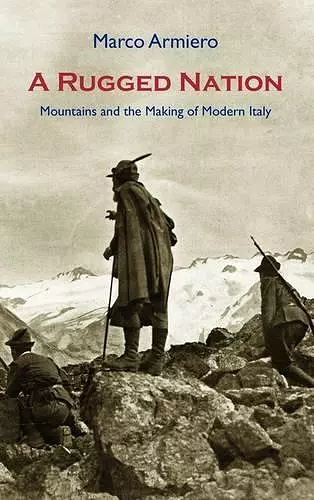A Rugged Nation
Mountains and the Making of Modern Italy
Format:Hardback
Publisher:White Horse Press
Published:15th Jul '11
Currently unavailable, and unfortunately no date known when it will be back

Landscape, politics and history: the Italian mountains as a crucible of national and natural identity. This book is part of a wider current in environmental history, that explores the links between nature and nation. It uncovers how Italian identity and mountains have constituted one another. It argues that state regimes since unification in 1861 have made mountains into national symbols and resources, thereby affecting mountain communities and ecosystems. The nationalisation of Italian mountains has been a story of military conquest and resistance, ecological and social transformation, expropriating resources and imposing meanings. The wind of 'big' history was rolling through the Alps and the Apennines: State building and national identities, totalitarianism and democracy, economic development and environmental protection, scientific knowledge and vernacular practices are the substance of this book. The book starts with the revaluation of mountains as the repository of the last Italian wilderness and chronicles the discovery/ invention of mountains as wild, primitive, and rebellious places needing to be tamed. War World I permanently transformed mountain landscapes and people, nationalising both. When the Fascists came to power, the process of politicisation of mountains reached its acme; the regime constructed and exploited mountains both rhetorically and materially, on one hand celebrating ruralism and rural people and, on the other, giving mountain natural resources to large hydro-electric corporations. Having been the sanctuary of Resistance against the Nazi-Fascist occupation, the Italian mountains were emptied by the economic boom of the 1960s; only recently have the green of natural parks and the white of the ski resorts become the distinctive colors of the new, tourist-oriented Italian mountains.
This is a highly original book that changes the way we think about one of the oldest and most studied nations on earth. Through abundant details and intriguing stories, Armiero convincingly shows how central to Italy's identity its mountains have become. Donald Worster, author of A Passion for Nature: The Life of John Muir Armiero scales the summits of environmental history, deftly blending cultural and materialist approaches. His book provides a full and fascinating account of the evolving role of mountains in shaping Italian nationalist imagination and the role of nationalism in shaping the mountain landscapes. J.R. McNeill [Armiero] deftly weaves together the varied threads of ecological and socioeconomic connections of mountain country and mountain peoples in the fabric of modern Italian history. The result is a rich and convincing pattern revealing the shapes of mountain images and mountain realities in culture, resistance movements, war, hydropower development, and landscape changes ... a new perspective on Italy. (Donald Hughes, Environmental History) Armiero proves the centrality of the European Alps and the Apennines in the narratives of the nation and its territory from the very beginning of the process of unification, and also in the conception and implementation of major public policies related to forestry, energy, tourism ... he combines, in a very fruitful way, an approach in terms of environmental history and the analysis of the symbolic aspects of the building of the Italian nation, materiality, and narratives. (Bernard Debarbieux, Mountain Research and Development)
ISBN: 9781874267645
Dimensions: 229mm x 152mm x 17mm
Weight: 532g
246 pages